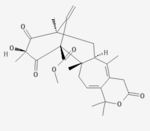Berkeleydione
From Wikipedia, the free encyclopedia
| Berkeleydione | ||
|---|---|---|
 | ||
| Identifiers | ||
| PubChem | 21580417 | |
| Jmol-3D images | {{#if:CC1=C2CC(=O)OC(C2=CC[C@]3([C@H]1C[C@@]4(C(=C)[C@]3(C(=O)[C@@](C4=O)(C)O)C(=O)OC)C)C)(C)C|Image 1 | |
| ||
| Properties | ||
| Molecular formula | C26H32O7 | |
| Molar mass | 456.53 g mol−1 | |
| Except where noted otherwise, data are given for materials in their standard state (at 25 °C (77 °F), 100 kPa) | ||
| Infobox references | ||
Berkeleydione is a marine fungal isolate with in vitro anticancer activity. [1] It was first discovered in fungal species which evolved to live in the Berkeley Pit.
Notes
- ↑ Stierle, DB; Stierle, AA; Hobbs, JD; Stokken, J; Clardy, J (2004). "Berkeleydione and berkeleytrione, new bioactive metabolites from an acid mine organism". Organic letters 6 (6): 1049–52. doi:10.1021/ol049852k. PMID 15012097.
This article is issued from Wikipedia. The text is available under the Creative Commons Attribution/Share Alike; additional terms may apply for the media files.